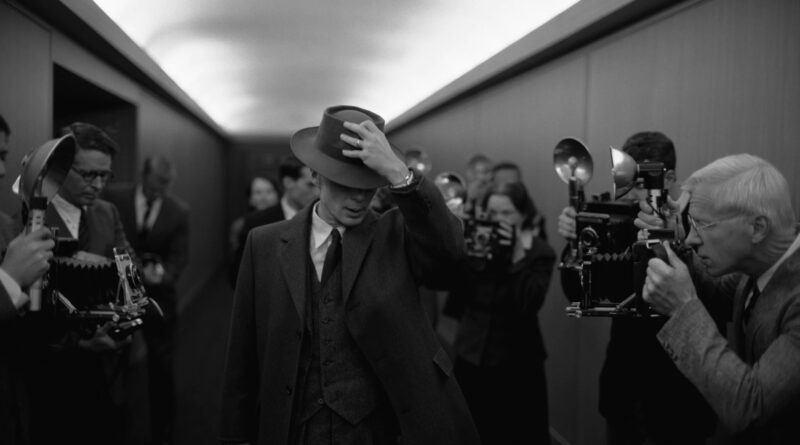Review ‘Oppenheimer’
Christopher Nolan’s Epic Masterpiece OPPENHEIMER Blows Audiences Away
The film is a modern greek tragedy that asks similar questions of purpose, existentialism and morality as Nolan’s other films but in a numbingly subtle way. There are no upside down cities or missions through space in Oppenheimer, but Nolan does well in reminding audiences of what exists beyond our mortal knowledge and rooting these metaphysical concepts in reality. Much like the 2005 novel American Prometheus: The Triumph and Tragedy of J. Robert Oppenheimer by Kai Bird and Martin J. Sherwin, Nolan also refers to Oppenheimer as Prometheus—a titan who stole fire from the gods and gave it to man. Introducing Oppenheimer as a parallel to this titular character in mythology pushes audiences to look at the birth of the atomic bomb differently. Nolan instills the idea that the power of the gods was given to us by one physicist who forever changed the world, while coaxing audiences to ask Should we even have this sort of power?

In terms of technicality, Nolan once again proves there is no director quite like him. The creation of this movie is an unfathomable feat. Nolan truly delivers one of the biggest films of our time—and we mean big in every sense. The production includes numerous Hollywood stars, a bombastic score by Ludwig Göransson, little to no CGI (yes, he really did set an actual bomb off to film this movie) and he filmed in IMAX. Nolan even had new IMAX cameras built for this production in order to film certain scenes without colour, as by the time IMAX cameras were invented filmmakers had stopped making black and white films. There is truly no director on Nolan’s level and this movie proves that.
A visual, visceral and downright mind-blowing spectacle, Oppenheimer is edited with Nolan’s signature keen precision and pace while dabbling in various artistic sequences that seem almost ethereal while watching. We see what resides inside Oppenheimer’s brain; the many sparks and fires that would one day become particles and atoms erupting through nuclear fission. There were some choice decisions in regards to sound design. Nolan is an absolute genius and one should never question him, although most of the flack Nolan receives is in relation to his use of sound. Despite one or two instances where audiences might feel the sound design takes away from the film instead of adding to it, Nolan expertly uses the score and sound to construct a simultaneous feeling of dread and inevitability. Audiences will feel their heart rates spike during various moments in this film due to this exact technique. This movie truly does feel like a ticking time bomb leading up to the third act.
Cillian Murphy does an exceptional job embodying the real life historical figure. His eyes are often wide and erratic, as if constantly absorbing the world through a million lenses a minute. He and Nolan’s collaboration on this character leads us down a very thin line between two moral chasms but never gives us a real answer—is Oppenheimer a good person or a bad one? There’s never a moment in this film that shows us he could definitively be either. They leave it up to us to decide. Once those credits role, this question of morality is what will haunt audiences for years to come. On one hand, Oppenheimer’s invention saved thousands of American lives and ended the war. On the other, the hundreds of thousands of deaths in Hiroshima and Nagasaki would only be the first of many mass destructions mankind was now capable of committing thanks to Oppenheimer. It started with World War II, but where would it end? Nolan does an expert job in communicating the complex moral qualm Oppenheimer sits with after creating the atomic bomb… and Murphy does an excellent job at performing it.

Besides impressive performances from heavy hitters like Matt Damon as Leslie Groves, Emily Blunt as Kitty Oppenheimer and Florence Pugh as Jean Tatlock, the star of this film is undoubtedly Robert Downey Jr. as Lewis Strauss. Coming out of years stuck in the same skin, he sheds his Iron Man facade to bring us the most compelling character of the film. His performance is outstanding and worth a Best Supporting Actor win at the Academy Awards. There are numerous fun additions to the cast including The Boys’ Jack Quaid and Drake and Josh’s Josh Peck, but Robert Downey Jr. seizes his opportunity to remind the world exactly why he stands on top of it. Bravo, RDJ.
This movie will surely divide audiences and Nolan fans. Nolan abandons his usual story driven model to dive deeper into character study. This may partly be because the story isn’t fictitious—Oppenheimer is a retelling of historical events. Because of this, Nolan presents this film almost through a first person perspective, allowing us to see everything through Oppenheimer’s view (besides the parts in black and white). Audiences might even find themselves frustrated with Oppenheimer, who falls in love with creating this bomb due to his passion for physics and theory then, later on, regrets his choice to invent it due to the carnage it causes… and could potentially cause in the future. Oppenheimer is essentially used by the government to win the war and then ostracized by them after he decides against supporting the hydrogen bomb (which would be even more destructive than the one he created). The story does well in showing us how history continues on, even without those who helped shape it. But what the film leaves you with is a single realization: the power of an idea.
A common thread throughout the film is how scientists are different from everybody else. This is explored a lot throughout the film but mostly with Robert Downey Jr.’s character Strauss. Albert Einstein, played by Tom Conti, has a pivotal conversation with Oppenheimer that explains how scientists are honoured as visionaries and legends. But in reality, they’re just being used to push along the agendas of those in power and will be tossed aside as soon as they’ve extinguished their use. But their ideas will live on forever, often times changing the world past a point of no return. They could begin as sparks and particles in the mind of one physicist and lead to the fiery destruction of the entire world.
Watch the trailer for Oppenheimer below
Universal Pictures releases Oppenheimer on July 21, 2023
Review by Guest Blogger Jurgen Sosa

